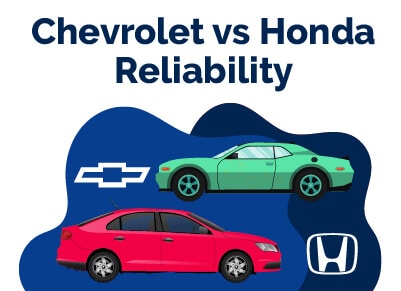Chevy vs. Honda Reliability
March 24, 2023


Chris is Head of Content for FindTheBestCarPrice and is based out of Philadelphia, PA. As a seasoned automotive industry analyst and car enthusiast, he ensures the highest level of quality across all our content and curates our picks for the best deals each month.
Chris studied information systems and marketing at Drexel University and writes about a wide range of topics ranging from car buying tips to troubleshooting common mechanical issues.
When he’s not thinking about cars, he likes to stay in with his dog and make an “attempt” to finish a crossword puzzle (he’s not quite at the Saturday/Sunday level…yet). As a former cheesemonger, Chris still has a “sharp” passion for all things cheese, and his fridge is always loaded with it!
Chris also has a passion for things that go fast, and drones are no exception. He spends some of his time writing for Dronesourced.
Back in 2019, Chevrolet made waves with a TV ad claiming it would outshine Honda, Toyota, and Ford in reliability. In the automotive world, such bold claims draw attention, but when we sift through the data, comparing features, strengths, and weaknesses, Honda emerges as the more reliable contender.
Honda outpaces Chevy across the board – in quality, reliability, and durability, not to mention lower repair and maintenance costs.
Honda's reliability and safety scores soar above those of Chevy, although Chevy did clinch a better spot in the JD Power dependability survey.
Moreover, owning a Honda tends to be more wallet-friendly over the long haul, thanks to its lower total cost of ownership and maintenance expenses.
That said, Chevy does have its victories, shining in a few select areas where it outperforms Honda.
Read on to learn more about Chevy vs. Honda reliability and factors you should consider before choosing one.
Table of Contents
Chevy vs. Honda Reliability: A Detailed Comparison
| Features | Chevy | Honda |
| Gas Mileage | ||
| Engine and Performance | ||
| Safety | ||
| Design | ||
| Technology | ||
| Durability | ||
| Repair and Maintenance Cost |
Chevy vs. Honda Reliability: Which Is Better?
Honda is better than Chevy when it comes to reliability. For a regular car user or a mechanic, trying to put Chevy and Honda in the same category will sound ridiculous.
Honda presents an impressive standard and record of reliability that many brands will love to have. This is evident in the multiple awards that Honda has to its name.
Ranging from awards on quality, reliability, resale value, durability, and performance, you are getting the best essential car qualities you need.
But if Honda is better than Chevy, why did the Chevy brand release a commercial stating that Chevy is better than its competitors? Well, the truth isn't far. Chevy beats Honda in the 2022 JD Power dependability survey.
This has been the issue for some years, since 2018. Data collected from a survey, Chevy recorded 171 problems per 100 vehicles while Honda gets 230 per 100 vehicles.
Reliability isn't based only on these metrics.
According to RepairPal, Chevy has a reliability rating of 3.5/5.0, ranking 20th out of 32 car brands. This is compared to Honda, which ranked first out of 32 brands, with a 4.0/5.0.
The 2022 Consumer Reports reliability rankings survey places Chevy in the 20th spot, this is compared to Honda, which ranked fifth on Consumer reports reliability.
So, the thing is, even though Chevy tends to do better on JD Power's dependability, Honda has a better reliability rating.
Comparing the features and strengths of both car brands, Honda is doing a better job at building cars that last longer, giving fewer worries. You should ask a Chevy owner how much they've spent trying to change the transmissions of their cars regularly.
Although this greatly varies on different models, Hondas are built more to last. The differences in the designs of both cars boil down to perspective, and the warranty coverage is almost similar.
Honda is better than Chevy in fuel efficiency, safety ratings, repair, and maintenance cost. Still, you'll need to understand how the overall features of both cars work to help you make informed decisions.
Chevy vs. Honda Reliability: Design
In terms of design, Chevrolet and Honda offer a range of styles to suit different preferences.
Honda's design philosophy centers on “simplicity and something,” while Chevy is always about making bold and aggressive cars.
Chevrolet is known for its classic American muscle car style, with vehicles like the Camaro and the Corvette offering bold, aggressive styling.
Honda adopts a more refined and understated design, with vehicles like the Civic and Accord offering a more modern and sophisticated look. In this category, it comes down to personal preference.
However, you must not forget that Honda has a better reputation for making durable cars. Although Honda's reliability dropped over the years, you'd have fewer transmission issues.
The entire concept of car design and durability centers around your driving conditions and your ability to maintain your car.
Chevy vs. Honda Reliability: Engine and Performance
Both Chevrolet and Honda offer a range of engines in their vehicles, including smaller, more fuel-efficient options as well as more powerful options for those who need a bit more oomph. In terms of overall engine performance, both brands have a good track record for reliability.
Chevrolet is known for producing strong V8 engines for its trucks and SUVs, while Honda is known for its reliable and efficient four-cylinder engines. In this category, it's difficult to declare a clear winner as both brands have strong offerings.
The comparison between Chevy's and Honda's engines boils down to what you need in a car. Chevy engines deliver higher and better power, but you'll get better fuel efficiency on a Honda.
You must understand that different companies run both car brands. General Motors makes Chevy engines, while Honda Motor Co. makes Honda engines. The regulations and engine efficiency are largely different on both cars and also differ on their models and trims.
Winner: Both
Chevy vs. Honda Reliability: Safety and Technology
In terms of safety, both Chevrolet and Honda have a good track record. Both brands offer a range of safety features in their vehicles, including advanced airbags, stability control, and automatic emergency braking.
Regarding overall safety ratings, both brands have received high marks from organizations like the National Highway Traffic Safety Administration (NHTSA) and the Insurance Institute for Highway Safety (IIHS).
To declare a winner in this category, we have to study the safety ratings of both brands. Honda and Chevy have strong safety ratings, as visible on IIHS and NHTSA, but Honda beats Chevy with a higher safety rating on the 2022 IIHS Top Safety Pick(+) award.
Winner: Honda
Chevy vs. Honda Reliability: Gas Mileage
Both Chevrolet and Honda offer a range of vehicles with good gas mileage. Chevrolet has several fuel-efficient options in its lineup, including the Cruze and the Malibu, which offer impressive fuel efficiency for their respective class.
Honda is also known for its fuel-efficient vehicles, with options like the Civic and the Fit offering excellent gas mileage. Honda has a slight edge in this category, as it is known for producing several highly fuel-efficient vehicles.
While Chevy takes pride in building cars with superb engines, Honda builds more efficient engines. The ratings for Honda vs. Chevy gas mileage vary in different categories. While Honda has better gas mileage for compact cars and midsize SUVs, Chevy's Colorado truck beats the Honda Ridgeline.
Honda employs lots of technologies to achieve better gas mileage. These factors include using smaller engines, a light vehicle frame, and an optimized body design to achieve better aerodynamics.
Chevy vs. Honda Reliability: Repair and Maintenance Cost
It is cheaper to repair and maintain a Honda than a Chevy. Honda has an average annual repair and maintenance cost of $428, while Chevy has an average repair and maintenance cost of $649. Honda is better than Chevy in terms of cost and the frequency of major and minor damages.
Chevy has an average 0.3 chance of visiting a repair shop and a 15% chance of severe damage. Honda has an average of 0.3 and 10%, respectively. You can rely on the warranty Coverage of both car brands to minimize your expenses on repairs and maintenance.
Winner: Honda
Conclusion
Overall, both Chevrolet and Honda are reliable brands with robust offerings in terms of engine performance, safety ratings, and design.
Although Honda offers better features in different categories, the decision is yours. The best choice for you will depend on your specific needs and preferences.
Best Car Deals by Category
Frequently Asked Questions
Are Chevy cars worth buying?
Yes. Chevy cars are worth buying. They are somewhat better than they are perceived. Aside from having a better rating in the 2022 dependability survey, Chevy also has impressive customer satisfaction. Chevy cars last long, especially if you learn to drive well and maintain them properly.
Do Chevy cars last long?
Chevy cars will last up to 200,000 to 250,000 miles, with an average lifespan of 10 - 13 years. You must understand that the durability or longevity of your Chevy car depends on your maintenance culture and driving conditions.
Are Chevy and Chevrolet the same?
Yes. Chevy and Chevrolet are the same names for the same car and brand. Also referred to as the Chevrolet Motor Division, Chevy is a division of General Motors.
Posted in Car Buying Tips, Car Troubleshooting |




